- Home
- Joan Lowery Nixon
The Island of Dangerous Dreams Page 5
The Island of Dangerous Dreams Read online
Page 5
“Maybe you should have gone out for pro ball,” I suggested.
He sighed. “Maybe I should have, but it’s too late now.” Deliberately, he seemed to be changing the subject away from himself. “What do you want to be when you grow up?”
I got the same warm feeling inside that I always got when I thought about Dr. Kirschman. “I think I want to be an archaeologist,” I said.
Kurt gave me a quick sideways glance, then shrugged.
There was no point in talking to Kurt about archaeology. Besides, I wanted to know more about him. “What do you do as the judge’s secretary?” I asked. “Do you type letters and answer phones and all that?”
He shook his head. “I’m just one of his secretaries. He has office help who work with the phone and mail and all the other jobs office secretaries do. I handle other things for him.”
He stopped there, so I asked, “Like what?”
“All sorts of things, like making sure the boat is ready when he wants to take it out. It’s too complicated to go into right now.”
I felt sorry for this guy, whose biggest moments in life had to have been back in high school. It hadn’t taken me long to realize that the judge must be a pain to work for.
Kurt shoved back his chair and picked up my plate. “I’ll help,” I said.
He shook his head. “Sit down. You’re a guest, and I’m paid to do this sort of thing.”
So while he cleared the table and brought on dessert, I joined the others in listening to the judge, who, naturally, sat at the head of the table and pontificated. He began some long-winded, uninteresting story about the IRS and a major art purchase, so I tuned him out. I thought about Mom and Dad and desperately hoped they were getting their problems worked out. I was homesick for a home that might not be there when I got back to Texas, and the thought was so scary I had to fight away the tears.
Suddenly Benita began to choke, waving her hands in the air and jumping from her chair.
“Pound her on the back!” Norton jumped up too.
But Benita managed to recover enough to say, “No. I’m all right” She coughed again and said, “Water. It went down the wrong way.” She tried to smother another coughing fit as she hurried from the room.
The judge began to question Aldo about his travels, but Madelyn suddenly said, “I’d better make sure that Benita’s all right.” She pushed back her chair and left the room.
Aldo began to describe the details of some restaurant he liked in Monaco, and even though we had just eaten, his descriptions of the meals made me hungry.
About the time that I began to wonder what was taking Aunt Madelyn so long, she returned and slid back into her chair without a word. At the same time the overhead lights came on. We all blinked and squinted at each other in the sudden light.
Ellison appeared in the kitchen doorway and solemnly said, “The generator got fixed.”
“Obviously,” the judge answered.
Kurt had served us some kind of soppy pudding for dessert. Now that we could see it, no one seemed to want to eat it, which was just as well, because the judge stood up, tapping on his water glass. However, instead of giving an after-dinner speech, he said, “As soon as Benita returns, we’ll be ready to begin.”
Benita, still a little out of breath, spoke from the doorway to the living room. “Ooooh, such tantalizing mystery! Are we to have a treasure hunt?”
Judge Arlington-Hughes scowled at her. “Hunt, no. Treasure, yes. You are invited to come to the parlor to view the Peruvian artifact.”
It was like the bell announcing the end of class on the last day of school. Everyone frantically shoved back chairs, fumbling and scrambling as they tried not to trip over or step on the others in the general movement toward the living room.
I hung back, feeling more like an outsider than ever. I wasn’t really part of this group. But Kurt stepped up behind me and held my shoulders, giving me a gentle push forward. “Go ahead,” he said. “There’s a candle for you.”
“A candle?”
“On the table.”
“Look,” I said, turning toward him and lowering my voice, “I feel a little bit guilty about joining them. The judge didn’t want me to come. I can’t bid on that artifact.”
“You want to see it, don’t you?”
“Yes, but maybe later. Right now this is some kind of a big moment for him.”
“For you, too, unless you stay here talking and miss it,” he answered, and pulled the louvered doors closed between us.
Curiosity was stronger than guilt, so I willingly turned and stepped into the living room. The only light in the room came from the candles that Aunt Madelyn, Benita, Norton, and Aldo were holding and the solitary candle in a small brass candle holder on a nearby marble-topped table. I picked it up and joined the others, who were standing in a semicircle in front of the velvet-draped table, squeezing in between Aunt Madelyn and Benita. The flickering light distorted their features and cast giant, jerking shadows on the wall. The four adults were gripping their candles, not moving, not breathing, just staring at Judge Arlington-Hughes. I discovered that I was doing the same thing.
The judge hadn’t waited for me before beginning his show. From the few words I heard as I joined the group, he had been delivering some kind of short history of the artifact. He pulled a dark box from his coat pocket and paused, smiling.
“I want you to get your first glimpse of the stone under the spell of candlelight.”
He opened the box and laid the artifact on the black velvet in front of us, then leaned back in his chair.
We all gasped. I had never seen anything like that in my life, not even in some of the photographs that Dr. Sammy Kirschman had shown us. The topaz, which had to be even larger across than a silver dollar, was roughly cut, not faceted. But it was as deeply blue as seawater and sparkled with a gold sheen, the way the ocean had sparkled in the late afternoon sunlight.
The stone was ringed in gold, that ancient, deep yellow gold, soft and unevenly thick on three sides. I first thought that the top of the gold frame was lumpy and uneven with an awkward loop, but as I studied it the lumps became the figure and curling tail of a pinched-faced monkey—an insanely grinning monkey with tiny sharp paws that clutched the top of the topaz. I was drawn to the stone, yet at the same time that horrible monkey made me shiver.
The judge ordered, “Blow out your candles. Now we’ll see the artifact in its full glory under the spotlight.”
The others did, but I hesitated. I wanted to wait until the light came on. I didn’t want to be in this creepy house in the dark. It’s just as well that I didn’t follow orders.
Looking smug while the others were puffing out their candle flames, the judge turned the switch on the lamp, but nothing happened. He wiggled the bulb in the cone of the lamp, then glanced down at the floor.
“Drat!” he exploded. “That stupid Kurt! This lamp was supposed to be plugged in!”
The others were now concerned with what the judge was doing. I forgot that I didn’t belong here. I had even forgotten my manners. How often while I was growing up had I heard “Look, don’t touch!” And yet with nothing but the artifact on my mind, while everyone’s attention was diverted, I reached out to touch that stone.
It slid under my fingertips as smoothly as tidal-pool water, scummy and warm from the summer sun. For just an instant it lay under my hand.
I don’t know exactly what happened next, because it all took place too quickly. I was aware that the judge had bent down to plug in the lamp, but at the same time everyone seemed to move forward. I was jostled aside. The candle was knocked from my hand and went out. In the darkness there was a cry and a crackling, sizzling sound, a thump and a crash.
Terrified, not knowing what was taking place, I dropped to the floor, trying to roll into a ball. I heard someone scream, but it wasn’t me. I was making little whimpering noises to myself, wishing I were home, desperately wanting to be off this horrible island and back with my parents.
I heard running footsteps, and what sounded like people bumping and slamming into things. Voices were shouting “Where are the matches?” “Light the candles!” “What happened?” Then Aunt Madelyn, practically next to my ear, screamed, “Andrea!”
I opened my eyes and looked directly into the wide-open, sightless eyes of Judge Arlington-Hughes, whose bloodless face was just inches away from mine.
CHAPTER
6
Without consciously thinking about what I was doing, I scuttled backward as fast as I could go. I know that I connected with someone’s leg and for an instant got tangled in the black velvet cloth that lay on the floor next to the overturned table. “He’s dead, he’s dead, he’s dead!” I was screeching.
Strong hands grabbed me and jerked me to my feet. “Stop that,” Aldo demanded, so I did.
It was hard to breathe, and my legs had about as much strength as our dinner pudding, so I stumbled into the nearest chair.
Kurt, who had been bending over the judge, got to his feet. He stared down at the judge as though he were trying to figure out what had happened.
“Well?” Norton demanded.
Kurt slowly turned to look at him. “He’s dead,” he said.
“What was it?” Benita whimpered. “Did Justin have a heart attack?”
“Nothing wrong with the judge’s heart,” Ellison said. “The man been younger and litter than me.”
“But he was just sitting there,” Benita said.
“No,” Madelyn said. “Remember? He was fiddling with the lamp. It wouldn’t turn on, and he complained that Kurt was supposed to plug it in and hadn’t.”
“I’m sure I plugged it in,” Kurt said.
Norton shook his head. “No, no. I was at that end of the table. I could see Justin reach down, pick up the plug, and put it into the wall socket.”
“Then everything went dark,” Benita added. She was so pale that I hoped she’d decide to sit down, too, before she fell down. I shivered and tried to squirm more deeply into the puffy upholstery.
Kurt frowned. “I don’t understand what happened. The judge told me what he planned to do. You were all supposed to see the topaz by candlelight. Then he’d tell you to blow out your candles, and in the next instant he’d turn on the lamp.” He turned to Norton. “But you just said that you saw him plug in the lamp. How could you see this?”
I spoke up. “I was afraid of the dark so I waited to blow out my candle.”
“But Benita said it went dark when the judge plugged in the lamp.”
“Somebody shoved me, and I dropped the candle holder, and the candle went out.”
“Who shoved you?”
“I don’t know. Everybody seemed to push forward at the same time.”
Benita shuddered and in a small voice said, “Someone pushed me too.”
The lamp was lying on its side. Aldo stooped to pick it up. His fingers slid along the cord, and he held up the plug end for us to see. The wrapping around the cord had been sliced and peeled back. “Judge Arlington-Hughes was upset that the lamp hadn’t been plugged in,” Aldo said. “Apparently he didn’t see the state of this cord. When he plugged in the lamp his fingers must have connected with the bare wire.” He dropped the cord. “It looks as though he was electrocuted.”
“It’s the fault of that awful lamp! Where did it come from?” Madelyn demanded.
“It belong to me,” Ellison said. “The judge say he wants a spotlight, and that was the only lamp around here could do it. I got it out of the storeroom. Nobody been using it for a long time, but I didn’t see nothing wrong with the cord. Somebody maybe could have done that to the cord. On purpose.”
Kurt frowned as he thought. “I’m sure there was nothing wrong with that cord when I put the lamp there.”
“Did you plug in the lamp?” Aldo asked.
“I thought I had. I was supposed to. But the judge was wanting me to do one thing after another, and I may have forgotten.”
“The assumption that the cord was stripped is ridiculous,” Madelyn said. “That would mean that someone deliberately …” She didn’t finish the sentence.
Norton stared at Kurt, “Someone who knew what the judge’s plan was to be.”
Kurt took a step backward. “I didn’t kill the judge! Sure, I knew about his plan in advance. So did Ellison. But the rest of you could figure it out as soon as you saw the table all draped up with that black velvet and the lamp next to it. It could have been anyone here in this room!”
Every now and then the candles flickered. Each time they did our shadows leapt and jumped as though they were involved in a crazy kind of dance. I wrapped my arms around my shoulders, hugging myself, fighting against the cold that shivered like streaks of lightning up and down my back.
“This makes no sense,” Madelyn said. “Why should someone kill Justin?”
“For the artifact,” Benita said.
“But we were going to bid for it.”
Benita shrugged. “Maybe someone didn’t want to take the chance of losing it.”
“But who would want it enough to murder for it?”
“You ought to know the answer to that,” Benita said slowly. “Getting possession of it for the Sartington meant a great deal to you, didn’t it, Madelyn?”
I gasped, remembering another acquisition Madelyn had mentioned not long ago. But “I would have killed to get it” had to be a figure of speech. Surely Madelyn wouldn’t really murder anyone.
Madelyn could have won a prize in a haughtiness contest Coolly she said, “You’re being absurd, as usual, Benita. If you attempt to think logically—if that’s possible—you’ll realize that I’m the one person who would not have murdered to get possession of the stone. The Sartington collection is open to the public. Ergo, the artifact appears, and it’s obvious that I had taken it.”
She shook her head, and her eyes bored into those of her three competitors by turn. “Benita represents an art auction house and goodness knows who else, since it’s possible that she could be involved in some secret dealing. She’s done it before.”
“Well, really!” Benita exploded. “There’s nothing wrong in—”
But Aunt Madelyn hadn’t finished. Imperiously, she held up a hand and continued. “Norton, of course, is here for his elusive employer, Franklin Granakee, in whose private collection the stone would be just as elusive. And off in some Mideastern country the person Aldo represents could possess the artifact in secret forever.”
The three angrily denied the accusations until Kurt suddenly raised his voice. He was holding the black velvet cloth and the empty jewel case. “Where is the artifact?”
It was easy to see that it was not on the floor.
Benita gingerly pointed at the judge’s body. “Why—uh—Justin must have it.”
Kurt shook his head. “It wasn’t in his hands or under his body. I checked.”
All of them moved aimlessly, searching the floor and the tables, as if they could see the artifact in plain sight if they just stared hard enough.
I got up and walked over to Aunt Madelyn. I was so frightened that I needed to be close to someone.
“No point in looking around,” Kurt said. “And no point in looking anyplace else. Nobody had time to get out of this room, put that thing somewhere, and get back in again before the candles got lit.”
“He could have hidden it in a vase or drawer or someplace like that,” Benita suggested, which set off a rapid, fumbling search.
I pressed back out of the way, against the wall, wondering why one of the antiques didn’t get broken.
They came up empty-handed, all of them migrating to the center of the room.
“Obviously, the murderer has the topaz,” Benita said.
“Then the next step is obvious,” Madelyn said. “A personal search.”
“Absolutely not,” Norton said.
“Oh?” Madelyn’s dark eyebrows rose dramatically. “You must have a strong reason for refusing”.
“I do,” he snapped. He was so hyper that if he had jumped into the air, I wouldn’t have been surprised. “To begin with, a personal search would be a great indignity. But the most important reason is that none of us can trust any of the others. Would you want to be searched by Justin’s murderer?”
“I wouldn’t,” Kurt said quickly.
“I wouldn’t either!” Benita cried.
Madelyn shrugged. “I agree.”
I studied each in turn, wondering if one of them had killed Judge Arlington-Hughes. I forced myself to take a deep breath and think logically. “Dr. Kirschman always pointed out that we had to study scientific evidence before reaching a conclusion,” I said. “We can’t just decide by ourselves that the judge was murdered. Maybe it was only an accident.” I didn’t believe what I’d just told them, and it was obvious from their expressions that they didn’t believe me either.
Aunt Madelyn’s lips were tight. “Andrea, be realistic.”
“I’m just trying to say that it’s up to the police to make the decision.”
Norton’s voice was high and tight, and I could see him clenching and unclenching his fingers. “Of course we must call the police. There are things they should know. We can’t stay trapped here on this island with—with a dead body.”
“There’s no telephone,” Kurt told him. “The judge liked to really get away from it all.”
“Ham radio, then?”
“The only broadcast radio was on the boat.”
“What about on the rest of this island?” Benita asked, her fingers plucking nervously at the fringe on a small pillow. “Are there other people living here? Anyone who could help?”
“No. It’s just undeveloped property. The island belonged to the judge, and his is the only house on it.”
“Surely there must be some way we can reach the authorities,” Aldo demanded. He paused. “What country governs this island?”
“The Bahama Islands government,” Kurt said. “The nearest office is in Freeport.”
“How do we get there?”

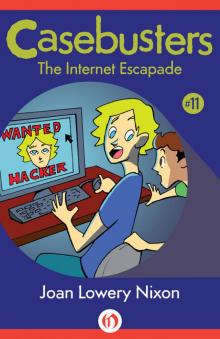 The Internet Escapade
The Internet Escapade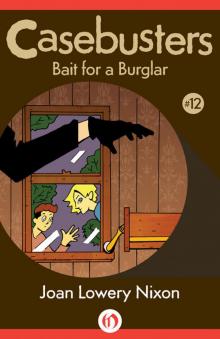 Bait for a Burglar
Bait for a Burglar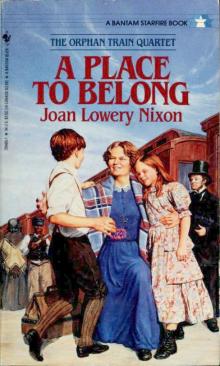 A Place to Belong
A Place to Belong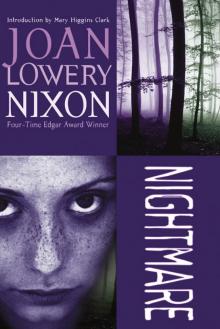 Nightmare
Nightmare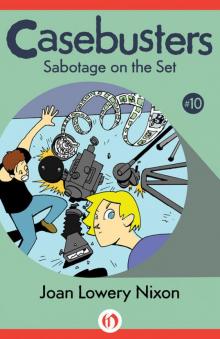 Sabotage on the Set
Sabotage on the Set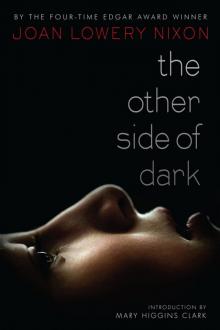 The Other Side of Dark
The Other Side of Dark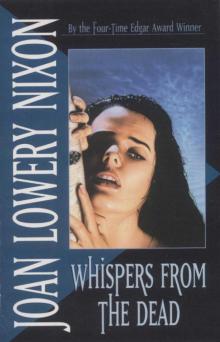 Whispers from the Dead
Whispers from the Dead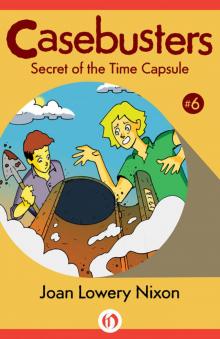 Secret of the Time Capsule
Secret of the Time Capsule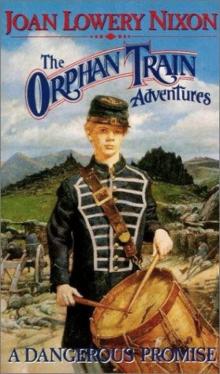 A Dangerous Promise
A Dangerous Promise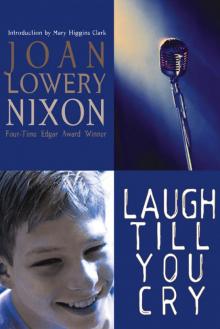 Laugh Till You Cry
Laugh Till You Cry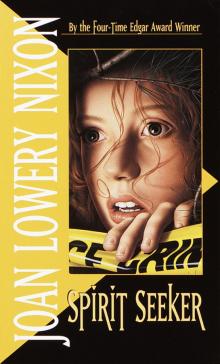 Spirit Seeker
Spirit Seeker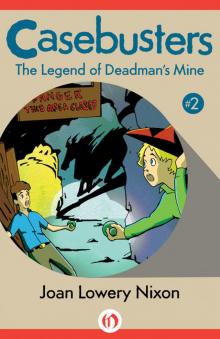 The Legend of Deadman's Mine
The Legend of Deadman's Mine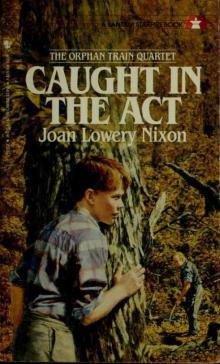 Caught in the Act
Caught in the Act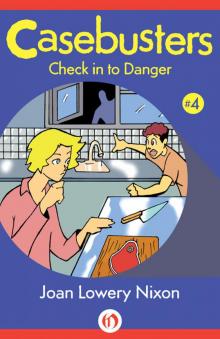 Check in to Danger
Check in to Danger Ellis Island: Three Novels
Ellis Island: Three Novels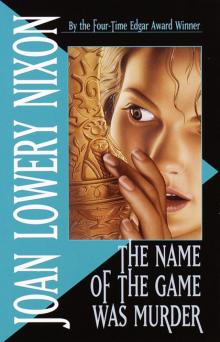 The Name of the Game Was Murder
The Name of the Game Was Murder The Haunting
The Haunting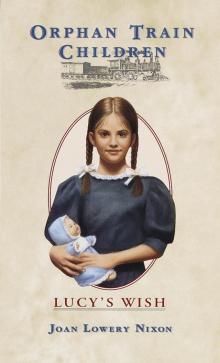 Lucy’s Wish
Lucy’s Wish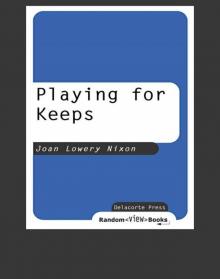 Playing for Keeps
Playing for Keeps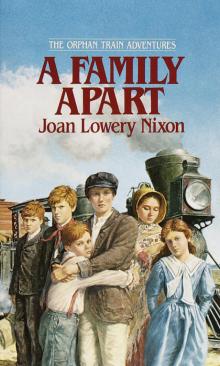 A Family Apart
A Family Apart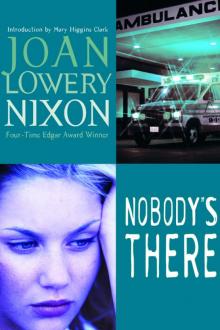 Nobody's There
Nobody's There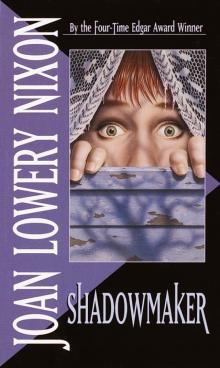 Shadowmaker
Shadowmaker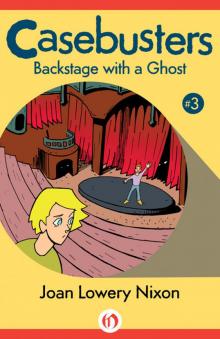 Backstage with a Ghost
Backstage with a Ghost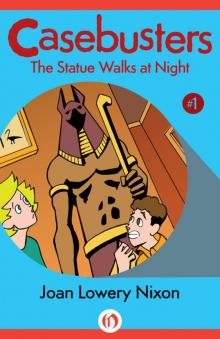 The Statue Walks at Night
The Statue Walks at Night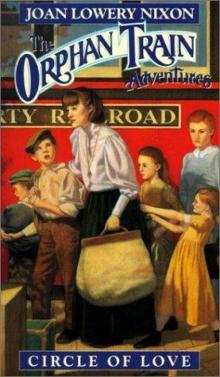 Circle of Love
Circle of Love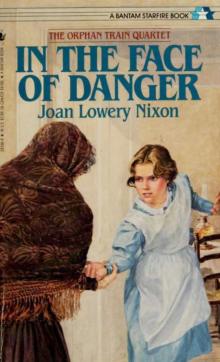 In the Face of Danger
In the Face of Danger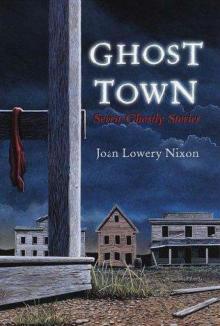 Ghost Town
Ghost Town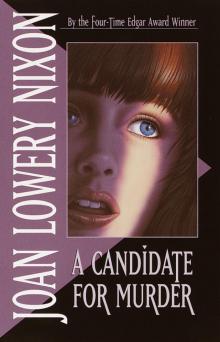 A Candidate for Murder
A Candidate for Murder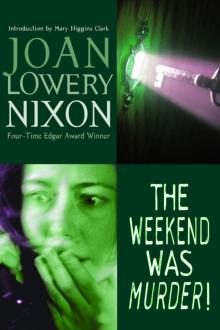 The Weekend Was Murder
The Weekend Was Murder The Island of Dangerous Dreams
The Island of Dangerous Dreams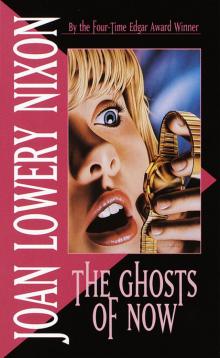 The Ghosts of Now
The Ghosts of Now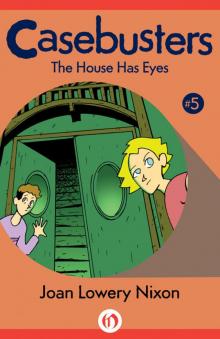 The House Has Eyes
The House Has Eyes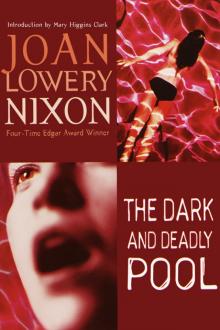 The Dark and Deadly Pool
The Dark and Deadly Pool Keeping Secrets
Keeping Secrets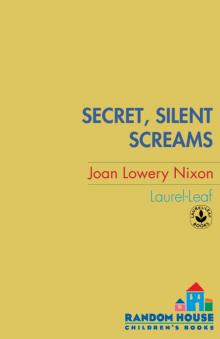 Secret, Silent Screams
Secret, Silent Screams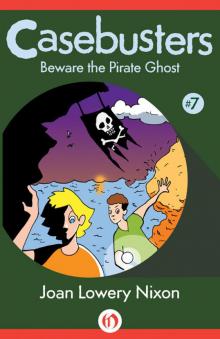 Beware the Pirate Ghost
Beware the Pirate Ghost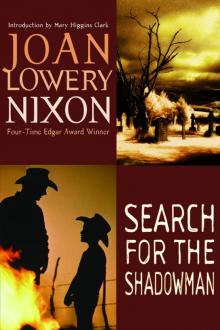 Search for the Shadowman
Search for the Shadowman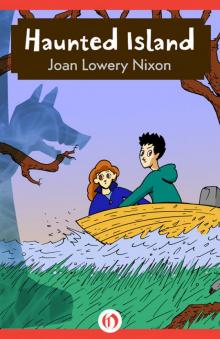 Haunted Island
Haunted Island